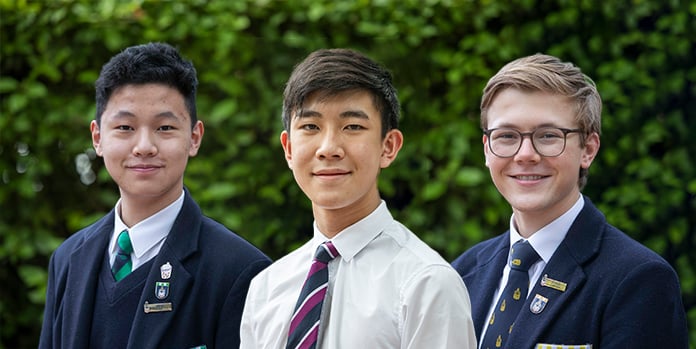When Melbourne Grammar broke its 40-year debating win drought in 2018, no one could have predicted that the next four years would include a historic winning streak.
In 2021, our Year 12 team—Kelvin Cao, Albert Du, and William Flintoft—led our School to victory in the Debaters Association of Victoria Schools A Grade Competition for the fourth year in a row. This powerhouse team also won their C Grade (Year 10) and B Grade (Year 11) championships, making them the first Melbourne Grammar team to have won three successive State titles.
Added to these achievements, our Year 9 D Grade team of Hirunaka Ekanayake, Alexander Kartel, and Sanjeet Sampath also took home the State championship at their level.
Why this year’s team was different
According to Teacher in Charge of Debating, Vincent Chiang (OM 2010), this year’s A Grade team were not only skilled debaters in their own right, but had an exceptional ability to collaborate. “As a team, they’re greater than the sum of their parts,” he says.
The boys wholeheartedly agree. “You don’t have to be the one to make the most important point,” says Kelvin. “We’re here as a team, and we’re here for each other.”
“We treat the team as a single unit,” adds Albert, who is the 2021 Captain of Debating. “We cooperate to reach our goals—we’re not internally competitive.”
“Another strength of this team is their humility,” says Vincent. “They were always ready to listen, improve, and try their best.”
Seeing both sides of the argument
Alongside improved public speaking skills and the ability to think on their feet, the team members also say their experiences have taught them something about considering another person’s point of view.
“Debating is not simply about winning or being the more aggressive side. It’s more about being respectful,” remarks Kelvin. “Quite often you are not debating the side you are most familiar with or even the one that you fundamentally agree with. Debating encourages you to consider alternatives with respect and empathy.”
“We often get the message that the world can be understood in absolute terms,” adds William. “As debaters, we get the chance to think about ideas in a more complex and nuanced way. Topics are regularly chosen because they are not one-sided and there is no definitive solution to the problem that is presented. The answer isn’t always a clear ‘yes’ or ‘no’. It can be: ‘sometimes’.”



